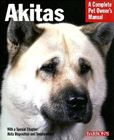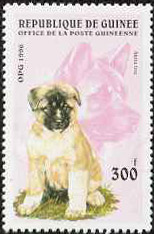
Akitas: The Complete Pet Owner's Manual
Akitas, also known as Japanese Akitas, are magnificent dogs, a little bigger than German Shepherds, very powerful looking, with short, thick fur and curled, upright tails. They are bold and strong-willed dogs, and are best suited to owners with experience of dogs and knowledge of training, preferably with experience of spitz dogs or other independent breeds, rather than just labradors and golden retrievers!
Akitas need to have house rules laid down from when they are pups, or they can become pushy. Resource guarding can be a problem unless these dogs are carefully trained. Akitas can learn fast, but are easily bored by repetition in training. They like company and being given interesting things to do. Akitas left at home all day and given little to do when owners are home are likely to become difficult to handle. The breed was initially developed to fight other dogs and work as a guard dog, though they are used in a range of activities today, as police dogs, guard dogs, and even service dogs, helping disabled people. They swim well, and can be good retrievers, if trained when they are young. There are two main types, the Japanese lines, which tend to be smaller, and US Akitas. Both types of Akita need careful training, and are best kept active, and allowed to be part of the family.
Akitas can be aloof with strangers while bonding strongly with their owners. They usually get on well with children in the household, though need supervision, and cannot always be trusted with visiting children. They are not suitable for households where neighbourhood children are often running in and out of the house and garden, though well socialized Akitas will accept sensible visiting children who respect them, and who have been introduced by their owners. Akita puppies need careful socialisation, both with other dogs and with humans. Akitas may still become dog aggressive as they get older, despite socialization. It is safer to exercise them on a lead, because they can't always be trusted with other dogs. They need a large garden with a high fence, since they are good at jumping, and not everyone can walk an Akita, so there may be days when they have to get their exercise in the garden. The fence should be mostly solid so that they do not have to see other dogs or small children trying to tease them - and teasing an Akita is not a sensible thing to do! Tying up an Akita with no fence is asking for trouble, since children could easily approach the dog and get hurt. Akitas are natural guard dogs, and should not be taught to distrust strangers. It's safer to lock gates to ensure that no strangers can get unsupervised access to the garden, even if your Akita is well-socialised.
Some owners take pride in owning a 'tough' dog, and there are even a few breeders who prize aggression against other dogs or humans. It is unwise to take on a dog from such a breeder, since even a relatively placid Akita is a lot to take on. It's much safer to choose a pup which has two parents of nice temperaments, and which has already been socialized to be friendly with children.
Akitas don't shed much, except when they 'blow' their coats, when they need a lot of grooming. They can be quite vocal, making a range of sounds, which owners learn to interpret. They are clean dogs, and easy to housetrain. Health problems include those common to large breeds, such as vulnerability to bloat. Akitas should be fed at least twice a day and allowed to rest after eating. Diet and exercise levels for puppies are also important to allow their bones to grow properly. Other health problems include canine hip dysplasia, problems with their kneecaps and eyes, hypothyroidism, allergic skin diseases and general autoimmune problems.
This book is a short, introductory guide to Akitas from a US vet, Dan Rice. He explains to novices what to expect from their dogs, and how to care for them and get the best out of them. It's clearly written, and is good as far as it goes, though experienced owners are likely to want more.



